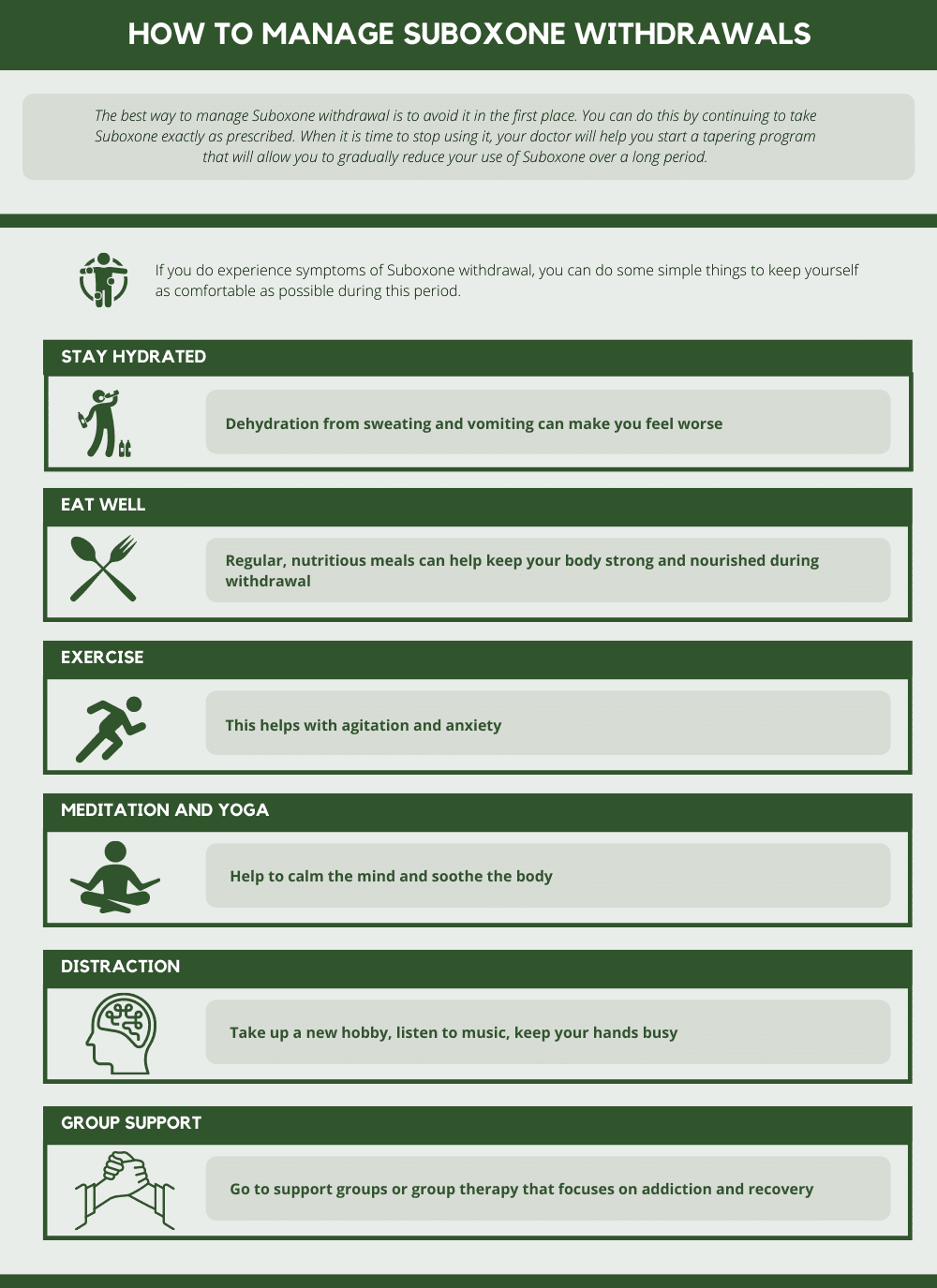Opioid addiction affects every part of a person’s life and can wreak havoc on their physical, mental health emotional, and social health. Unfortunately, it can be very difficult to overcome opioid addiction. Most people need treatment and ongoing support to stop using opioids and maintain sobriety for life.
One of the tools used by medical professionals to help people overcome opioid addiction is a prescription drug called Suboxone. Used as prescribed in a medically supervised environment, this medication can be a powerful aid in the fight against opioid addiction by giving people a chance to stop using opioids without going through dangerous or severely uncomfortable Suboxone withdrawal symptoms that often arise when one attempts to quit cold turkey.
Reducing or stopping Suboxone can still result in withdrawal symptoms, and you may require help managing these symptoms when you decide to stop using it. To understand how to avoid or manage Suboxone withdrawal, it is helpful to learn more about how this drug works and what happens to your body and mind when you stop taking it.
How Does Suboxone Work?
Suboxone is a prescription drug people take to treat opioid use disorder. It is made of two substances: Naloxone, which blocks specific opioid receptors, and Buprenorphine. Buprenorphine is an opioid that binds to opioid receptors in the brain and blocks other opioids from binding there.
While Suboxone binds to opioid receptors, it does not produce the same “high” or euphoria that opioids like oxycodone and heroin do. Because of the way it works within the brain, taking Suboxone can ease withdrawal symptoms from opioids and has less risk of addiction than other prescription medications like methadone.
The Risk of Drug Abuse with Addiction Medicine
Despite its benefits, Suboxone itself can become addictive when misused or abused by those attempting to combat an opioid use disorder. Buprenorphine, the main active ingredient, is a partial opioid agonist, which means it activates the same brain receptors as opioids but to a lesser extent. This characteristic can lead to physical dependence over time, and suddenly stopping Suboxone can trigger withdrawal symptoms.
Additionally, some individuals may misuse Suboxone by taking higher doses than prescribed or using it for non-medical reasons, seeking a euphoric effect. This misuse can lead to the development of psychological dependence, where the individual feels compelled to use Suboxone despite negative consequences.
Signs that someone is abusing their Suboxone supply may include taking larger doses than prescribed, using it more frequently than directed, or engaging in alternative routes of administration (e.g., crushing and snorting the tablets). People who abuse Suboxone may exhibit secretive behavior, trying to hide their usage from others. They may also seek multiple prescriptions from different doctors, commonly known as “doctor shopping.”
Social isolation, neglecting responsibilities, and changes in mood or behavior can be indicative of Suboxone abuse. In some cases, individuals may also combine Suboxone with other drugs to enhance its effects, which can increase the risk of dangerous interactions and overdose.
Identifying these signs and seeking timely intervention through professional help with Woburn Addiction Treatment is crucial to address the potential addictive behavior and support the individual toward recovery. Attending a Woburn Addiction Treatment treatment center can play a role in alleviating common opioid withdrawal symptoms and drug cravings in a safe environment with the guidance of a medical professional.

Symptoms of Withdrawal From Suboxone
Used as prescribed to treat opioid addiction, your body may become dependent on the presence of Suboxone. If you cut back or begin Suboxone detox, you may experience withdrawal symptoms. These symptoms may be less severe than the symptoms of opioid withdrawal, but they can be very uncomfortable. Common Suboxone withdrawal symptoms include:
Physical Symptoms
Suboxone withdrawal can result in a range of physical symptoms, which can be uncomfortable and distressing. These symptoms occur as the body adjusts to the absence of the drug. The intensity and duration of physical symptoms can vary depending on factors such as the dosage of Suboxone used, the duration of Suboxone use, and individual differences. Some common physical symptoms of Suboxone withdrawal include:
- Nausea
- Vomiting
- Abdominal Cramps
- Sweating
- Chills
- Runny Nose
- Joint Pain
- Body Aches and Muscle Pain
- Insomnia or Disturbed Sleep
- Twitching or Restlessness
- Fever

Psychological Symptoms
Suboxone withdrawal can lead to various psychological symptoms, as the drug affects the brain’s chemistry and neurobiology. Psychological symptoms can be challenging to cope with and may contribute to the overall discomfort experienced during the suboxone withdrawal timeline. Some common psychological symptoms of Suboxone withdrawal include:
- Anxiety
- Depression
- Irritability
- Mood swings
- Difficulty concentrating
- Cravings
- Emotional sensitivity
- Lack of motivation
- Sense of hopelessness
- Apathy
- Agitation
- Difficulty coping with stress
Suboxone Withdrawal Timeline
Because Buprenorphine (one of the ingredients in Suboxone) stays in the body for up to three days, you may not begin to notice withdrawal symptoms right away. It can take up to four days for severe withdrawal symptoms to begin and they tend to last for about a week. After about two weeks, the acute phase of Suboxone withdrawal will be over. It is very common for people to continue to experience intense cravings for the drug and to feel depressed or anxious long after the acute withdrawal phase.
Day 1 to 3:
- Within the first 24 hours after the last dose, individuals may start experiencing early withdrawal symptoms.
- Symptoms may include anxiety, restlessness, runny nose, watery eyes, muscle aches, sweating, chills, and yawning.
- Insomnia and difficulty sleeping are common during this period.
Day 4 to 7:
- Physical aspects typically peak during this time, with intense muscle aches, joint pain, and gastrointestinal issues such as nausea, vomiting, diarrhea, and abdominal cramps.
- Psychological aspects like irritability, mood swings, and difficulty concentrating may become more pronounced.
- Cravings for Suboxone or other opioids may be strong during this period.
- Energy levels are low, and fatigue is prominent.
Day 8 to 14:
- Physical aspects begin to gradually improve, but some discomfort may persist especially gastrointestinal issues.
- Psychological aspects, such as depression and anxiety, may still be present but might start to lessen.
- Sleep patterns may begin to normalize, but some individuals may still experience insomnia.
Week 2 to 4:
- Most physical aspects have subsided, although some mild discomfort or fatigue may persist.
- Psychological aspects may continue to improve, but mood swings and irritability can still occur.
- Cravings may decrease in intensity but can still be present.
Week 4 and beyond:
- Physical aspects and uncomfortable symptoms should be mostly resolved, but some individuals may experience residual effects for a longer period.
- Psychological aspects, such as depression and anxiety, may gradually improve, but it can take time for emotional stabilization.
- Cravings for Suboxone or other opioids may occur sporadically and lessen over time with continued abstinence.
It’s important to remember that everyone’s experience with Suboxone withdrawal is different. Some individuals may have a more prolonged or intense withdrawal process, while others may find it more manageable.
Most people need addiction treatment and education to manage their emotions and cravings without returning to using substances. At Woburn Addiction Treatment, we find it important to include talk therapy and behavioral therapy in your journey to sobriety in order to help you learn the skills you need to achieve lifelong recovery.
The best way to manage Suboxone withdrawal and overcome physical opioid dependence is by continuing to take Suboxone exactly as prescribed. When it is time to stop using this substance, our doctors will help you start a tapering program that will allow you to gradually reduce your use of Suboxone during the detox process.
If you do experience symptoms of Suboxone withdrawal, you can do some simple things to keep yourself as comfortable as possible during this period.
- Stay hydrated – dehydration from sweating and vomiting can make you feel worse
- Eat well – regular nutritious meals can help keep your body strong and nourished during withdrawal
- Exercise – this helps with agitation and anxiety
- Meditation and yoga – help to calm the mind and soothe the body
- Distraction – take up a new hobby, listen to music, keep your hands busy
- Group: emotional support – go to support groups or group therapy that focuses on drug addiction and recovery
These practices can help with the immediate effects of withdrawal when quitting suboxone. You should also make a plan for ongoing treatment. Relapse is common when people do not have ongoing support. Starting an addiction treatment program at Woburn Addiction Treatment gives you the best chance of avoiding relapse. In our opioid treatment program, you will receive counseling, education, and group support that will give you the best chance to fully recover from addiction and stay sober in the long term.
Suboxone is used to help treat the physical aspects of addiction, but addiction is not just a physical issue. To overcome addiction, you should learn new coping skills and have lifelong support to live the full, healthy, self-directed life you deserve. Addiction treatment is essential to your lifelong recovery.
Learn More About Managing Suboxone Withdrawal at Woburn Addiction Treatment
Seeking out a specialized addiction treatment center like Woburn Addiction Treatment is paramount when attempting to treat Suboxone abuse disorder. At our substance abuse treatment center, we offer a comprehensive and evidence-based approach to address the unique challenges of Suboxone abuse. With a team of experienced and compassionate professionals, we provide personalized treatment plans tailored to each individual’s needs.
Participating in a medically supervised detox program will ensure that you are safe and comfortable during the withdrawal process, minimizing the risk of severe withdrawal symptoms and complications that may arise when attempting to detox independently. Under our care, individuals can focus on their recovery journey with the confidence that their physical and psychological well-being is a top priority.
At Woburn Addiction Treatment we take a holistic approach to treat Suboxone abuse disorder, acknowledging that addiction impacts various facets of a person’s life. Beyond detoxification, we offer a wide range of therapeutic services and alternative therapies, including individual counseling, group therapy, family therapy, and holistic modalities like yoga and meditation.
This comprehensive approach addresses not only the physical aspects of addiction but also the emotional, social, and spiritual dimensions, empowering individuals to develop coping strategies and life skills for sustained sobriety. By choosing Woburn Addiction Treatment, individuals with Suboxone abuse disorder can access a supportive and nurturing environment that fosters healing, growth, and lasting recovery.
If you or someone you love require life-changing addiction treatment, please call the admissions counselors at Woburn Addiction Treatment today. We want to work with you to help you recover from addiction and learn how to live a healthy life without using substances. We offer a range of programs through our treatment centers that care for your body and mind and will work with your schedule. Call (781) 622-9190 to learn more.


